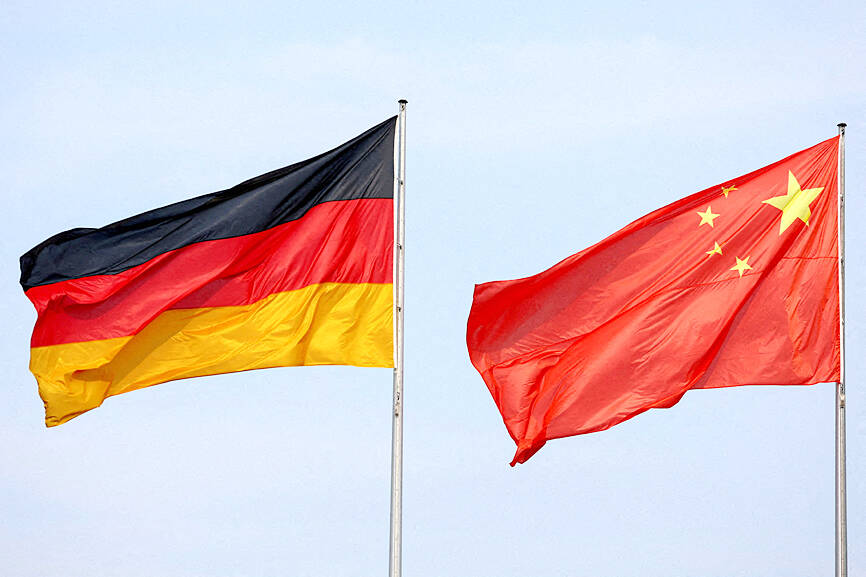Germany is considering scaling back plans to ramp up government screening of Chinese investments, the Wall Street Journal said.
A decision to ease back from a planned foreign investment screening law had become likelier due to fears that scrutiny on Chinese investments could hurt Berlin’s efforts to revitalize Germany’s economy, the report said, citing unidentified people familiar with the plan.
The plan for the bill proposed giving the government powers to screen foreign investments for security risks, a German Ministry for Economic Affairs and Climate Action paper seen by the Wall Street Journal said.

Phot: Reuters
The bill would allow the government to review new types of greenfield investments, including quantum technology, sophisticated semiconductors, artificial intelligence and critical infrastructure, the Wall Street Journal reported, citing the ministry’s paper.
The government also sought to include a provision that would allow the screening of cooperation projects between German research institutions and foreign partners in critical areas.
No final decision on the plan has been made, but “both ideas will likely be dropped,” the report said.
A German government spokesperson declined to give a comment to the Wall Street Journal on the deliberations, but said: “Investment screening is designed to avoid risks to security and public order in Germany. At the same time, it is important to remain open to foreign investments.”
The country needs an economic turnaround in order to secure its geopolitical position, German Minister of Finance and Free Democratic Party head Christian Lindner said on Saturday last week.
In its World Economic Outlook report, the IMF cut its forecasts for German GDP by 0.3 percentage points for both years.
It is expecting 0.2 percent growth this year and 1.3 percent next year, the IMF report said.
These forecasts are below the estimates of 0.8 percent for this year and 1.5 percent for next year for the eurozone, showing that Germany has become a laggard in the bloc.
It was also the only major economy to suffer a contraction last year.
Lindner said Germany’s economic weakness has consequences for security and geopolitics.
“We need the economic turnaround, because in the end, economic strength is also a factor in geopolitics,” Lindner said at Additional reporting by Reuters

MULTIFACETED: A task force has analyzed possible scenarios and created responses to assist domestic industries in dealing with US tariffs, the economics minister said The Executive Yuan is tomorrow to announce countermeasures to US President Donald Trump’s planned reciprocal tariffs, although the details of the plan would not be made public until Monday next week, Minister of Economic Affairs J.W. Kuo (郭智輝) said yesterday. The Cabinet established an economic and trade task force in November last year to deal with US trade and tariff related issues, Kuo told reporters outside the legislature in Taipei. The task force has been analyzing and evaluating all kinds of scenarios to identify suitable responses and determine how best to assist domestic industries in managing the effects of Trump’s tariffs, he

TIGHT-LIPPED: UMC said it had no merger plans at the moment, after Nikkei Asia reported that the firm and GlobalFoundries were considering restarting merger talks United Microelectronics Corp (UMC, 聯電), the world’s No. 4 contract chipmaker, yesterday launched a new US$5 billion 12-inch chip factory in Singapore as part of its latest effort to diversify its manufacturing footprint amid growing geopolitical risks. The new factory, adjacent to UMC’s existing Singapore fab in the Pasir Res Wafer Fab Park, is scheduled to enter volume production next year, utilizing mature 22-nanometer and 28-nanometer process technologies, UMC said in a statement. The company plans to invest US$5 billion during the first phase of the new fab, which would have an installed capacity of 30,000 12-inch wafers per month, it said. The

‘SWASTICAR’: Tesla CEO Elon Musk’s close association with Donald Trump has prompted opponents to brand him a ‘Nazi’ and resulted in a dramatic drop in sales Demonstrators descended on Tesla Inc dealerships across the US, and in Europe and Canada on Saturday to protest company chief Elon Musk, who has amassed extraordinary power as a top adviser to US President Donald Trump. Waving signs with messages such as “Musk is stealing our money” and “Reclaim our country,” the protests largely took place peacefully following fiery episodes of vandalism on Tesla vehicles, dealerships and other facilities in recent weeks that US officials have denounced as terrorism. Hundreds rallied on Saturday outside the Tesla dealership in Manhattan. Some blasted Musk, the world’s richest man, while others demanded the shuttering of his

Taiwan’s official purchasing managers’ index (PMI) last month rose 0.2 percentage points to 54.2, in a second consecutive month of expansion, thanks to front-loading demand intended to avoid potential US tariff hikes, the Chung-Hua Institution for Economic Research (CIER, 中華經濟研究院) said yesterday. While short-term demand appeared robust, uncertainties rose due to US President Donald Trump’s unpredictable trade policy, CIER president Lien Hsien-ming (連賢明) told a news conference in Taipei. Taiwan’s economy this year would be characterized by high-level fluctuations and the volatility would be wilder than most expect, Lien said Demand for electronics, particularly semiconductors, continues to benefit from US technology giants’ effort